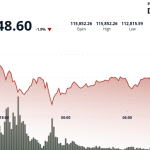Franklin Templeton CEO Championing Blockchain Integration
“The ‘advantages of blockchain are so compelling that we don’t foresee the shift to digital asset technology being slow or incremental,’ Franklin Templeton CEO Jenny Johnson declared in a new opinion piece for Fortune, signifying a significant pivot in mainstream finance thinking.
Financial institutions face a pivotal question: Will they embrace, resist, or ignore the rapidly evolving crypto landscape?
Jennifer Johnson, CEO of Franklin Templeton—one of the world’s largest asset managers with nearly $1.5 trillion in assets under management—recounted the firm’s journey embracing digital assets since early 2021. During the piece published in Fortune, Johnson asserted that “the advantages of blockchain are so compelling that we don’t foresee the shift to digital asset technology being slow or incremental.”
“Indeed, we expect our industry will evolve more in the next five years than in the last 50,” the executive added. “The pressing question is whether financial institutions will choose to embrace the digital asset wave (and the disruption coming with it), actively fight it or bury its head in the sand.”
Johnson noted the transformative potential inherent in blockchain technology and the growing crypto ecosystem. Key advantages cited include:
- Innovation in access: Providing new financial options for underserved populations, particularly homeowners.
- Global integration: Facilitating smoother cross-border transactions and market integration.
- Scalability: Delivering transaction throughput capacity potentially reaching hundreds of thousands or even millions of transactions per second.
The CEO highlighted Franklin Templeton’s practical engagement with digital assets. The asset manager holds a notable portfolio of previous and current crypto-related products, including what was once the largest spot Bitcoin ETF in the US, and has actively participated in developing and launching tokenized money market funds accessible via various blockchains, including Solana and Base. This Tuesday, the firm further demonstrated its commitment with the introduction of an intraday yield feature utilizing blockchain technology.
Broader Trend: Traditional Finance Enters Crypto Space
The emerging crypto-crypto dialogue isn’t confined to Franklin Templeton. Other veteran institutions are increasingly adapting.
BlackRock—commanding $11.6 trillion in assets under management—stands as another major asset manager actively providing direct access to crypto through its Bitcoin and Ethereum ETFs and ongoing regulatory interaction with the SEC. The firm’s iShares Bitcoin Trust (IBIT) currently stands as the largest spot Bitcoin ETF, holding approximately $72.6 billion in net assets.
Similarly, investment bank JPMorgan has maintained its presence since at least 2020 with its JPM Coin, a stable dollar-pegged digital currency designed for institutional clients. Spokespersons linked to the bank appear poised to expand crypto products’ utility, potentially including acceptance of crypto ETFs as eligible collateral for loans. Furthermore, CEO Jamie Dimon previously stated clients would soon be able to buy Bitcoin custody-lessly via JPMorgan channels.
“Crypto has killed the weekend: Hedge funds quietly scramble to adapt”
Despite this institutional onboarding, a significant counter-narrative underscores the delicate balance.
“TradFi is building Ethereum L2s to tokenize trillions in RWAs — Inside story”
On Thursday, outgoing Financial Stability Board Chair Klaas Knot contended that while crypto currently poses no systemic risk to traditional finance, “we may be approaching a tipping point here.” Areas cited for regulatory concern include the rapid proliferation of crypto ETFs and the evolving stablecoin landscape.
The FSB official’s warning comes almost on the heels of Dimon’s statements, highlighting the dual trajectory of integration and regulatory caution within traditional finance.
Industry Shift: Balancing Enthusiasm and Caution
Momentum runs strong among large financial institutions exploring digital assets, driven by the desire to replicate the blended models of traditional finance and decentralized technologies, often referred to as TradFiCrypto convergence.
The initiative isn’t limited to security tokens; Franklin Templeton is tokenizing fiat money market funds, and proof-of-stake blocks like Solana and Base are showing potential due to their less energy-intensive consensus mechanisms compared to Bitcoin.
The outcome hinges critically on whether this trajectory leads toward beneficial enhancements or increases systemic instability.












